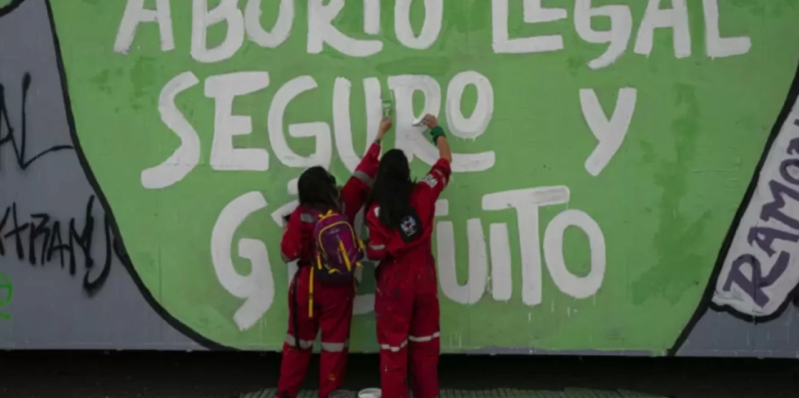
On Tuesday (May 27), the government of President Gabriel Boric presented a bill to the Chilean Congress to legalize abortion on demand without specific grounds up to 14 weeks of gestation. This initiative, one of the president's campaign promises, aims to "expand reproductive rights" for women in the country. The bill is scheduled to be debated in Congress starting today (June 2).
Since 2017, Chile has allowed abortion only under three circumstances: when the mother's life is at risk, in cases of a non-viable fetus, and in cases of rape. However, the implementation of this law has faced obstacles, including conscientious objections from healthcare professionals.
The bill proposes to legalize voluntary abortion without the need to cite specific justifications. It would allow the procedure to be performed within the public healthcare system, ensuring access to necessary medications and surgical interventions. The Minister of Women and Gender Equity, Antonia Orellana, emphasized that the measure seeks to prevent the criminalization of women who choose to terminate their pregnancies and to reduce the risks associated with clandestine abortions.
However, representatives from various Christian communities have voiced strong opposition to this and any pro-abortion initiative.
The Mesa Ampliada (UNE), CUPREM, and the Council of Bishops and Pastors have rejected the government's proposal to legalize abortion on demand. In a joint statement, they asserted that “the debate was already settled” with Law 21.030 and urged Congress “to focus on the country’s truly urgent issues: security, healthcare, housing, and the declining birthrate.”
The statement outlines seven points opposing the bill, presenting specific arguments against abortion. These include references to Hippocratic principles, Roman cultural laws, and the writings of Tertullian in his Apologeticus, in which the Carthaginian presbyter addressed the Roman Senate around the year 200 CE, expressing opposition to abortion and advocating for the protection of life from conception.
The statement also cites a warning from an ancient “proverbial culture” dating back 3,000 years: “No man has power over the spirit to retain the spirit, nor power over the day of death.” Additionally, it highlights Chile’s low birth rate, noting that the country ranks among the 15 nations with the lowest total fertility rate.
Point six of the document urges authorities to devote and “invest their limited remaining time” in this administration to “building and seeking consensus to resolve the serious and complex issues” the country is currently facing.
In its final point, the statement asserts: “It must be considered that for Christians—a significant portion of our country’s population—the principles and common sense derived from the Holy Scriptures are our standard of faith and conduct, as they were yesterday and will be tomorrow. Therefore, we respectfully and firmly urge our authorities to take into account what is expressed in this declaration and not to revisit a matter already resolved by the citizenry.”
The document is signed by Bishops Eduardo Cid Cortés (President of the Evangelical Wesleyan Mission Church and National President of the Mesa Ampliada), Jorge Méndez Jara (President of the Council of Bishops and Pastors of Chile), Wilfredo Villa Pinochet (Council of Pastoral Units of the Metropolitan Region), Francisco Rivera Mardones, Lic. (Presiding Bishop of the Church Encounter with God and International President of the Mesa Ampliada), and Apostle Mareo Torres Sánchez (President of the National Apostolic Council).
Other Christian denominations, including the Standing Committee of the Chilean Episcopal Conference (CECh), also issued an official statement expressing deep concern over the Chilean government’s intention to present a bill to legalize abortion.
The prelates cited Pope Francis’s 2024 homily Dignitas Infinita, in which the recently deceased pontiff stated: “A human being is always sacred and inviolable, in any situation and at every stage of development. He is an end in himself and never a means to solve other difficulties.”
They added: “In a country striving for greater justice and dignity for all, we urge that the value of human life—especially that of the most defenseless—not be relativized.”
To conclude, the statement from the Chilean Episcopate reads: “Finally, we echo the words of Pope Leo XIV in his recent address to the Diplomatic Corps: ‘No one is exempt from promoting environments that uphold the dignity of every person, especially the most fragile and defenseless—from the unborn child to the elderly, from the sick to the unemployed, whether citizens or immigrants.’ We urge authorities and legislators to fulfill their responsibility by promoting a truly inclusive society in which all human life, without exception, is welcomed and protected.”
In Parliament, the relevant committees already anticipate a complex debate. The presidents of both chambers have stated that they will not prioritize the bill’s discussion, presenting a significant obstacle to its progress.
A notable statistic: According to the Public Studies Center, 34% of Chileans believe voluntary abortion should be available to women in all circumstances. Meanwhile, 50% think it should be permitted only in specific cases, according to Ciudadano News.
Originally published at Diario Cristiano, Christian Daily International's Spanish edition.





